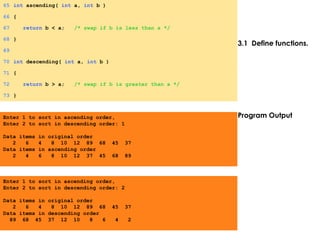This document outlines pointers and related concepts in C programming. It begins with an introduction to pointers, noting they are powerful but difficult to master. It then covers pointer variable declarations and initialization, the pointer operators & and *, calling functions by reference using pointers, and using const with pointers. Later sections discuss pointer expressions and arithmetic, the relationship between pointers and arrays, arrays of pointers, and pointers to functions. The document provides examples to illustrate key pointer concepts.
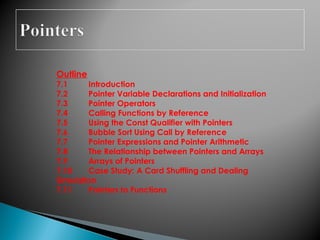
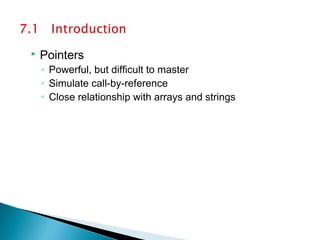

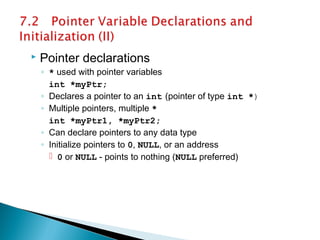
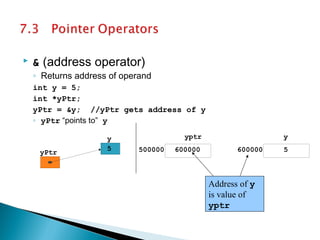
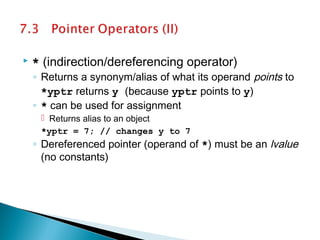
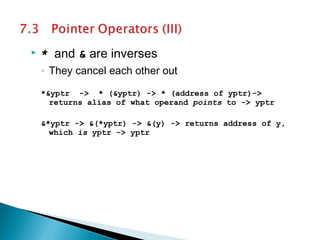
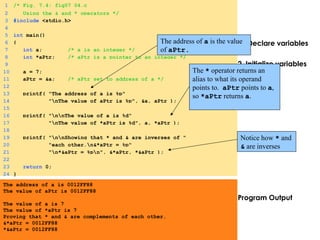
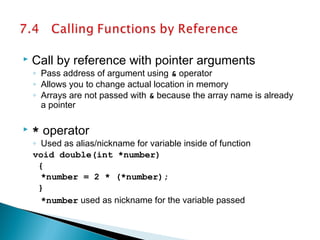
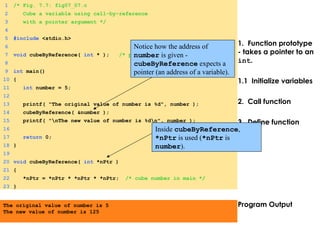
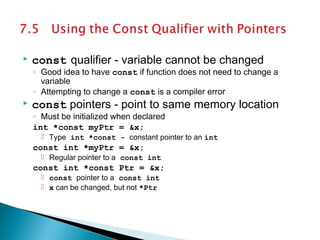
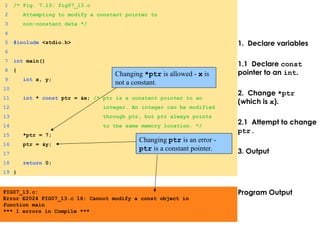
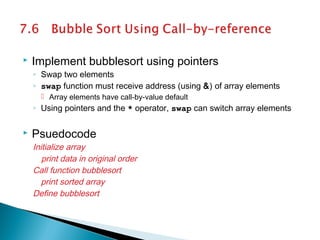
![ sizeof
◦ Returns size of operand in bytes
◦ For arrays: size of 1 element * number of elements
◦ if sizeof(int) = 4 bytes, then
int myArray[10];
printf( "%d", sizeof( myArray ) );
will print 40
sizeof can be used with
◦ Variable names
◦ Type name
◦ Constant values](https://image.slidesharecdn.com/cchap07-150414223936-conversion-gate01/85/pointers-14-320.jpg)
![1. Initialize array
1.1 Declare variables
2. Print array
2.1 Call bubbleSort
2.2 Print array
1 /* Fig. 7.15: fig07_15.c
2 This program puts values into an array, sorts the values into
3 ascending order, and prints the resulting array. */
4 #include <stdio.h>
5 #define SIZE 10
6 void bubbleSort( int *, const int );
7
8 int main()
9 {
10
11 int a[ SIZE ] = { 2, 6, 4, 8, 10, 12, 89, 68, 45, 37 };
12 int i;
13
14 printf( "Data items in original ordern" );
15
16 for ( i = 0; i < SIZE; i++ )
17 printf( "%4d", a[ i ] );
18
19 bubbleSort( a, SIZE ); /* sort the array */
20 printf( "nData items in ascending ordern" );
21
22 for ( i = 0; i < SIZE; i++ )
23 printf( "%4d", a[ i ] );
24
25 printf( "n" );
26
27 return 0;
28 }
29
30 void bubbleSort( int *array, const int size )
31 {
32 void swap( int *, int * );
Bubblesort gets passed the
address of array elements
(pointers). The name of an
array is a pointer.](https://image.slidesharecdn.com/cchap07-150414223936-conversion-gate01/85/pointers-15-320.jpg)
![3. Function definitions
Program Output
33 int pass, j;
34 for ( pass = 0; pass < size - 1; pass++ )
35
36 for ( j = 0; j < size - 1; j++ )
37
38 if ( array[ j ] > array[ j + 1 ] )
39 swap( &array[ j ], &array[ j + 1 ] );
40 }
41
42 void swap( int *element1Ptr, int *element2Ptr )
43 {
44 int hold = *element1Ptr;
45 *element1Ptr = *element2Ptr;
46 *element2Ptr = hold;
47 }
Data items in original order
2 6 4 8 10 12 89 68 45 37
Data items in ascending order
2 4 6 8 10 12 37 45](https://image.slidesharecdn.com/cchap07-150414223936-conversion-gate01/85/pointers-16-320.jpg)
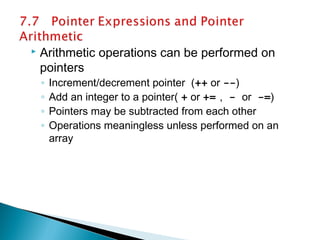
![ 5 element int array on machine with 4 byte ints
◦ vPtr points to first element v[0]
at location 3000. (vPtr = 3000)
◦ vPtr +=2; sets vPtr to 3008
vPtr points to v[2] (incremented
by 2), but machine has 4 byte ints.
pointer variable vPtr
v[0] v[1] v[2] v[4]v[3]
3000 3004 3008 3012 3016
location](https://image.slidesharecdn.com/cchap07-150414223936-conversion-gate01/85/pointers-18-320.jpg)
![ Subtracting pointers
◦ Returns number of elements from one to the other.
vPtr2 = v[2];
vPtr = v[0];
vPtr2 - vPtr == 2.
Pointer comparison ( <, == , > )
◦ See which pointer points to the higher numbered
array element
◦ Also, see if a pointer points to 0](https://image.slidesharecdn.com/cchap07-150414223936-conversion-gate01/85/pointers-19-320.jpg)
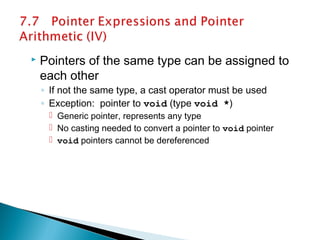
![ Arrays and pointers closely related
◦ Array name like a constant pointer
◦ Pointers can do array subscripting operations
Declare an array b[5] and a pointer bPtr
bPtr = b;
Array name actually a address of first element
OR
bPtr = &b[0]
Explicitly assign bPtr to address of first element](https://image.slidesharecdn.com/cchap07-150414223936-conversion-gate01/85/pointers-21-320.jpg)
![ Element b[n]
◦ can be accessed by *( bPtr + n )
◦ n - offset (pointer/offset notation)
◦ Array itself can use pointer arithmetic.
b[3] same as *(b + 3)
◦ Pointers can be subscripted (pointer/subscript
notation)
bPtr[3] same as b[3]](https://image.slidesharecdn.com/cchap07-150414223936-conversion-gate01/85/pointers-22-320.jpg)
![ Arrays can contain pointers - array of strings
char *suit[4] = {"Hearts", "Diamonds", "Clubs", "Spades" };
◦ String: pointer to first character
◦ char * - each element of suit is a pointer to a char
◦ Strings not actually in array - only pointers to string in array
suit array has a fixed size, but strings can be of any
size.
suit[3]
suit[2]
suit[1]
suit[0] ’H’ ’e’ ’a’ ’r’ ’t’ ’s’ ’0’
’D’ ’i’ ’a’ ’m’ ’o’ ’n’ ’d’ ’s’ ’0’
’C’ ’l’ ’u’ ’b’ ’s’ ’0’
’S’ ’p’ ’a’ ’d’ ’e’ ’s’ ’0’](https://image.slidesharecdn.com/cchap07-150414223936-conversion-gate01/85/pointers-23-320.jpg)
![ Card shuffling program
◦ Use array of pointers to strings
◦ Use double scripted array (suit, face)
◦ The numbers 1-52 go into the array - this is the order they are
dealt
Hearts
Diamonds
Clubs
Spades
0
1
2
3
Ace Two Three Four Five Six Seven Eight Nine Ten Jack Queen King
0 1 2 3 4 5 6 7 8 9 10 11 12
deck[2][12] represents the King of Clubs
Clubs King](https://image.slidesharecdn.com/cchap07-150414223936-conversion-gate01/85/pointers-24-320.jpg)
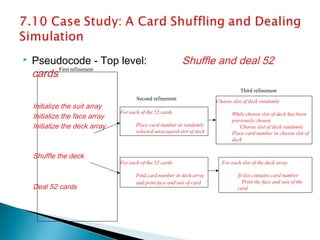
![1. Initialize suit and
face arrays
1.1 Initialize deck
array
2. Call function
shuffle
2.1 Call function deal
3. Define functions
1 /* Fig. 7.24: fig07_24.c
2 Card shuffling dealing program */
3 #include <stdio.h>
4 #include <stdlib.h>
5 #include <time.h>
6
7 void shuffle( int [][ 13 ] );
8 void deal( const int [][ 13 ], const char *[], const char *[] );
9
10 int main()
11 {
12 const char *suit[ 4 ] =
13 { "Hearts", "Diamonds", "Clubs", "Spades" };
14 const char *face[ 13 ] =
15 { "Ace", "Deuce", "Three", "Four",
16 "Five", "Six", "Seven", "Eight",
17 "Nine", "Ten", "Jack", "Queen", "King" };
18 int deck[ 4 ][ 13 ] = { 0 };
19
20 srand( time( 0 ) );
21
22 shuffle( deck );
23 deal( deck, face, suit );
24
25 return 0;
26 }
27
28 void shuffle( int wDeck[][ 13 ] )
29 {
30 int row, column, card;
31
32 for ( card = 1; card <= 52; card++ ) {](https://image.slidesharecdn.com/cchap07-150414223936-conversion-gate01/85/pointers-26-320.jpg)
![3. Define functions
33 do {
34 row = rand() % 4;
35 column = rand() % 13;
36 } while( wDeck[ row ][ column ] != 0 );
37
38 wDeck[ row ][ column ] = card;
39 }
40 }
41
42 void deal( const int wDeck[][ 13 ], const char *wFace[],
43 const char *wSuit[] )
44 {
45 int card, row, column;
46
47 for ( card = 1; card <= 52; card++ )
48
49 for ( row = 0; row <= 3; row++ )
50
51 for ( column = 0; column <= 12; column++ )
52
53 if ( wDeck[ row ][ column ] == card )
54 printf( "%5s of %-8s%c",
55 wFace[ column ], wSuit[ row ],
56 card % 2 == 0 ? 'n' : 't' );
57 }
The numbers 1-52 are
randomly placed into the
deck array.
Searches deck for the
card number, then prints
the face and suit.](https://image.slidesharecdn.com/cchap07-150414223936-conversion-gate01/85/pointers-27-320.jpg)
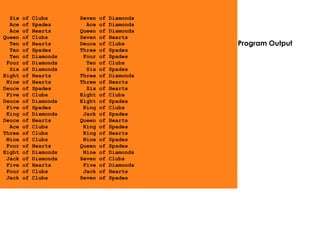
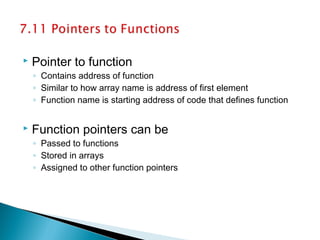
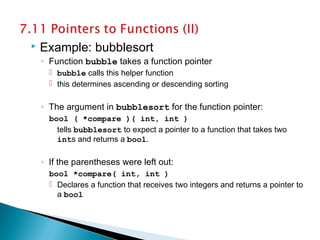
![1. Initialize array.
2. Prompt for
ascending or
descending sorting.
2.1 Put appropriate
function pointer into
bubblesort.
2.2 Call bubble.
3. Print results.
1 /* Fig. 7.26: fig07_26.c
2 Multipurpose sorting program using function pointers */
3 #include <stdio.h>
4 #define SIZE 10
5 void bubble( int [], const int, int (*)( int, int ) );
6 int ascending( int, int );
7 int descending( int, int );
8
9 int main()
10 {
11
12 int order,
13 counter,
14 a[ SIZE ] = { 2, 6, 4, 8, 10, 12, 89, 68, 45, 37 };
15
16 printf( "Enter 1 to sort in ascending order,n"
17 "Enter 2 to sort in descending order: " );
18 scanf( "%d", &order );
19 printf( "nData items in original ordern" );
20
21 for ( counter = 0; counter < SIZE; counter++ )
22 printf( "%5d", a[ counter ] );
23
24 if ( order == 1 ) {
25 bubble( a, SIZE, ascending );
26 printf( "nData items in ascending ordern" );
27 }
28 else {
29 bubble( a, SIZE, descending );
30 printf( "nData items in descending ordern" );
31 }
32
Notice the function pointer
parameter.](https://image.slidesharecdn.com/cchap07-150414223936-conversion-gate01/85/pointers-31-320.jpg)
![3.1 Define functions.
33 for ( counter = 0; counter < SIZE; counter++ )
34 printf( "%5d", a[ counter ] );
35
36 printf( "n" );
37
38 return 0;
39 }
40
41 void bubble( int work[], const int size,
42 int (*compare)( int, int ) )
43 {
44 int pass, count;
45
46 void swap( int *, int * );
47
48 for ( pass = 1; pass < size; pass++ )
49
50 for ( count = 0; count < size - 1; count++ )
51
52 if ( (*compare)( work[ count ], work[ count + 1 ] ) )
53 swap( &work[ count ], &work[ count + 1 ] );
54 }
55
56 void swap( int *element1Ptr, int *element2Ptr )
57 {
58 int temp;
59
60 temp = *element1Ptr;
61 *element1Ptr = *element2Ptr;
62 *element2Ptr = temp;
63 }
64
ascending and descending
return true or false.
bubble calls swap if the
function call returns true.
Notice how function pointers
are called using the
dereferencing operator. The *
is not required, but emphasizes
that compare is a function
pointer and not a function.](https://image.slidesharecdn.com/cchap07-150414223936-conversion-gate01/85/pointers-32-320.jpg)
